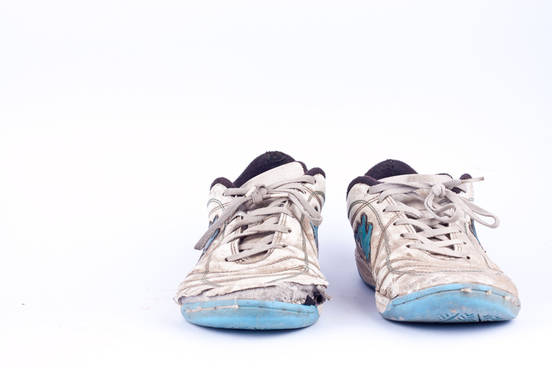
What is a fossil word?
In linguistics, a fossil is a word or sense of a word that was once in common use but is now obsolete or no longer actively used except in certain idioms, phrases, or other words. Take, for example, bumper in bumper crop. Bumper began as a word for a drinking vessel that is filled to the brim. Later, the word was applied to anything unusually large in amount or size and then was used attributively to describe large things. In the 19th century, people spoke of a "bumper business" or "bumper traffic." Today, this sense of bumper is used primarily to modify crop, so it has become fossilized in the phrase bumper crop, and thus bumper can be considered a fossil.
We invite you to put on your word paleontologist's weeds and wend your way through this gallery to discover more fossils.

'Pale' in 'Beyond the Pale'
An archaic sense of the noun pale was fossilized in the English language in the 18th century in the expression beyond the pale. The noun is unrelated to the familiar adjective meaning "deficient in color"; it is ultimately derived, by way of Anglo-French, from the Latin word palus, meaning "stake." In its literal uses, pale referred to both stakes and fences and to boundaries made up of stakes.
In the 15th and 16th centuries, the "boundary" sense of pale gave rise to a use denoting a specific geographical area with defined limits. Historically, the areas of Ireland, Scotland, and France that were dominated by the English were referred to as "the English pale." In time, the phrase beyond the pale came to be used for any place outside the English pale. People who sought to escape British domination were said to "leap the pale" when they passed over the area's boundaries.
Gradually pale took on a further metaphorical sense, meaning "the limits within which one is privileged or protected (as from censure)." Thus, to be "beyond the pale" is to be outside such protective limits. The phrase is most familiarly used in describing behavior that is regarded as shocking or uncivilized or in describing something that is viewed as outlandish.
… getting physical on a political rival was considered beyond the pale.
— Jason Zengerle, GQ, May 2012Cool girls, famous or not, have been rocking hair that's beyond the pale for more than a few seasons. Bombshell platinum, silver gray, and fairy-princess pastels were everywhere.
— Gina Way, Marie Claire, 1 Sept. 2016

'Nap' in 'Kidnap'
Meaning "to arrest" or "to seize unexpectedly," both nab and nap originated in 17th-century slang—in particular, criminal slang. Nab, which is likely an alteration of nap, is still commonly used today in its original sense.
Brazilian police nabbed the suspected kingpin of a gang that stole 37 million from online bank accounts.
— Andrew Noyes, The Washington Internet Daily, 1 Apr. 2005
Nap, on the other hand, fell into disuse by the 20th century, surviving only in the word kidnap. The kid in that word refers to a child, and that sense of kid also began as slang.
Kidnap originally referred to the practice in the 1600s and 1700s of stealing impoverished children from large cities in Great Britain and taking them to British colonies in North America and the Caribbean, where they were sold into servitude. The word was formed in the late 17th century possibly as a back-formation of kidnapper, which is attested a few years earlier. Napper itself was also used at the time as a slang word for "thief."
Etymologists aren't exactly sure where nap, meaning "to seize," originated, though they do suspect it may have Scandinavian origins. They do know, however, that nap referring to a short sleep taken during the day is unrelated: it comes from Old English hnappian, "to sleep," and has Germanic roots.

'Shod' in 'Slipshod' and 'Roughshod'
The adjective shod, meaning "wearing shoes," is from the past tense form of the Middle English verb shoen, "to shoe." Whereas in the past shod horses and shod feet were often spoken of, nowadays shod is rarely if ever used. Nevertheless, it has achieved a foothold in the language as a base word in slipshod and roughshod.
When the word slipshod was first used in the late 1500s, it meant "wearing loose shoes or slippers"—such slippers were once called slip-shoes—and later it was used to describe shoes that were falling apart. By the early 1800s, slipshod was used more generally as a synonym for shabby—in 1818, Sir Walter Scott wrote about "the half-bound and slip-shod volumes of the circulating library." The association with shabbiness later shifted to an association with sloppiness, and by the end of the century the word was used to mean "careless" or "slovenly."
You also find … even more slipshod writers just as much in vogue.
— William Howitt, Rural and Domestic Life of Germany, 1842Men … who lead a sort of facile, slipshod existence, doing nothing, yet mightily interested in what others do.
— Benjamin Disraeli, Sybil, 1845
Roughshod, on the other hand, originally described horses having shoes with protruding nails to give them better traction on slippery ground. Such shoes would also damage the ground or whatever (or whoever) was being ridden over. During the late 1700s, it seems a rather disturbing association occurred with riding a roughshod horse over terrain without concern and treating people in a disdainful or abusive manner without consideration since people began to use the expression to ride/run roughshod over for such treatment.
The d—l ride rough-shod over the rascally part of the creation.
— Aristophanes, 1778'Tis a scheme of the Romanists, so help me God! To ride over your most Royal Highness roughshod.
— Thomas Moore, Intercepted letters, 1813
In the end, shod may have found a permanent foothold in the English language in slipshod and roughshod, but its history with those words is less than admirable.

'Bated' in 'With Bated Breath'
You may be familiar with this line from William Shakespeare's play The Merchant of Venice:
Shall I bend low and, in a bondman’s key, / With bated breath and whisp’ring humbleness, / Say this ...
The adjective bated here is a contraction of abated through the loss of the unstressed first vowel (the linguistic term for this process is aphesis). The word means "reduced or lessened in force," so "bated breath" is breathing that is reduced in intensity usually under the influence of an emotion, such as awe or terror.
Although writers after Shakespeare used the adjective to modify words other than breath, it is in the phrase with bated breath that it has been fossilized. The related verb bate goes back to the 14th century but fell into disuse about the end of the 19th century. The verb abate, on the other hand, is gainfully employed. Lawyers frequently use it in statements referring to ending a nuisance, nullifying an action, or reducing a tax.

'Weeds' in 'Widow's Weeds'
Weeds in the term widow's weeds means "clothing" or "apparel." It's from the Old English word wǣd, which in Middle English became wede. This weed is not connected with the "unwanted plant" meaning of weed, which originates from Old English and Middle English wēod.
The "garment" sense of weed has been rarely used since the 19th century, and even then it occurred mostly in literary contexts. Weed could also once mean "armor" or "mail," but by the time Sir Walter Scott used it that way in The Bridal of Triermain in 1813, it was already rare.
In the past, weeds or weed was often used with a qualifying term to refer to a uniform or the distinctive garb of a particular profession or state in life. Some examples are "doctor’s weed," "shepherd's weeds," and "monastic weeds." 16th-century English poet Edmund Spenser also wrote of "A goodly lady clad in hunter's weed." Widow's weeds, too, referred at one time to something of a uniform, back when custom mandated a somewhat unvarying dress be worn by widows: a black gown with broad white cuffs and, in public, a crepe veil.
Eventually, widow's weeds became the only prevalent application of the increasingly rare weeds. In today's contexts, of course, the picturesque employment of widow's weeds refers simply to the black or dark-colored clothing a woman might wear at her spouse's funeral and in public for a period afterwards. In addition, it is not uncommon to see a writer using the term in non-mourning contexts, as demonstrated by The New Yorker's Janet Malcom in a September 2016 piece:
Martha Argerich's widow's-weeds black gowns heighten the beauty and mystery of her playing. Plainness is never a mistake on a concert stage.
Such creative use breathes new life into widow's weeds and brings to mind, if only transiently, the all but forgotten weeds, as well.

'Nill' in 'Willy-Nilly'
Depending upon the contexts in which it was used in early examples, willy-nilly may have been an alteration of any one of three possible phrases: will I nill I, will he nill he, or will ye nill ye, or even all three. All the phrases express having no choice. Nill was formed in Old English by blending the negative particle ne and the verb wyllan, "to wish," thus producing nyllan, "not to wish." William Shakespeare uses the will/nill phrase in The Taming of the Shrew:
Thus in plain terms: your father hath consented / That you shall be my wife your dowry greed on; / And, will you, nill you, I will marry you. [In other words: I will marry you, whether you like it or not.]
The only trace of nill today is in the expression willy-nilly, which is used as an adverb or adjective meaning "by compulsion" or "without regard to individual inclination."
... if you're a single child or an only child, you don't have anybody else to bounce ideas off of, so you just do whatever, willy-nilly …
— Raven-Symoné Christina Pearman, ABC Transcripts, 7 Sept. 2015Far from being willy-nilly, the conventional disarmament proposal appears to have been carefully calculated for maximum impact in Western Europe.
— Jim Hoagland, The Washington Post, 22 Apr. 1986
Another sense of the term is "in a haphazard manner," which was probably influenced by the compulsiveness and disregard associated with being willy-nilly.
Even the house's floor plan has a playful nature: It twists and turns and rambles, as if rooms were added willy-nilly. — Joe Bargmann, Country Living, October 2009
… grass often grows chest high in the failing, willy-nilly cracks of deserted parking lots. — Tom Chiarella, Esquire, June/July 2014

'Wit' in 'To Wit'
Wit dates back to Old English and its earliest use was as a verb meaning "to know." Over the centuries, the word has occurred in various forms along the lines of witen, and its past tense was wiste or a similar form. The present first and third singular tense of witen was wot or wat.
Grendel ... wiste þe geornor, þæt his aldres wæs ende gegongen. [Grendel ... knew the more eagerly that the end had arrived for his life on earth.]
— BeowulfThe perill of this place I better wot then you.
— Edmund Spenser, The Faerie Queene, 1590
In Middle English, a spelling variant of witen developed, weten, which was later altered to weet. William Shakespeare used the variant in the tragedy Antony and Cleopatra:
I bind, / On pain of punishment, the world to weet / We stand up peerless.
Although the verb wit is no longer used in modern English, it was fossilized back in the 16th century in the expression to wit—a shortened form of the Middle English construction that is to wit, meaning "that is to know; that is to say" or "namely."
Their winning culture ... has made it hard to leave and encouraged players to do what is seemingly impossible in most corners of the NBA: take a pay cut for the greater good. To wit: Duncan went from earning about $21 million in the 2011-12 season to signing a three-year deal last summer that paid him $30 million combined.
— Sam Amick and Jeff Zillgitt, USA Today, 7 June 2013

'Boon' in 'Boon Companion'
The adjective boon is a 14th-century borrowing of Anglo-French bon, meaning "good." It was especially used in what were originally French phrases, like boon voyage to imply a prosperous journey. During the 17th century, however, it seems English speakers came to the realization that the word had a distinctively French quality, causing them to gradually stop using it except in the phrase boon companion, which names a close friend.
In current English, boon is also a noun for something that is a blessing or benefit. That word derives from the Old Norse word for "request," bōn, and, in Middle English was originally used for a prayer before becoming a word for a favor asked. Those uses are essentially obsolete, and today the noun refers primarily to a timely good thing received and enjoyed.
… the young congressman is spearheading a viable piece of legislation that would provide a nationwide boon to businesses that develop and implement new manufacturing technology such as 3D printing.
— Popular Mechanics, November 2014

'Wend' in 'Wend One's Way'
Wenden is a Middle English verb derived from Old English wendan that eventually became the modern English wend, which is mostly seen and heard in the construction "to wend one's way." That phrase goes back to the 13th century and had the same meaning as it does today: "to proceed on one's way." In the past, wend was also generally used with the meaning "to go," and people would wend to all kinds of places.
From of Romes shore, my Muse her selfe doth wend, And would her course unto Great Briton bend.
— Robert Pricket, Times Anotomie, 1606Then mounted he upon his Steede againe, And with the Lady backward sought to wend.
— Edmund Spenser, The Faerie Queene, 1590Supperless to bed, the plunderers wend, And feast upon the pleasant dreams which on deceit attend.
— Thomas Park, Sonnets, 1797Regrettest thou from this gloomy earth I wend, Where joys ecstatic rule the raptured hour?
— G. Hoghton, Eliza, 1800
In modern English, when we encounter wend, it is almost always in the sense "to proceed on" and in the form "to wend one's way." In that regard, wend is a fossil word.
They were wending their way through Bronson Canyon, a rocky area that sits downhill from the Hollywood sign….
— Wired, June 2016The orange isn't a fashion choice but rather the uniform of San Francisco County Jail #5, where some 700 offenders wait as they wend their way through the criminal justice system.
— Alexander Nazaryan, Newsweek, 30 Dec. 2016
However, you may occasionally spy wend without way—without any object, for that matter. This use of the word is relatively infrequent, but it does exist, which means that wend can only be considered a fossil in its transitive use—that is, when it has way as its object.
Desert-dwelling elephants follow the contours of the ancient Huab River Valley, wending through the timeless landscapes of the Torra Conservancy….
— Alexandra Fuller, National Geographic, June 2011
You may be wondering if the past tense verb went is connected with wend. In fact, went was originally the past tense and past participle of wend. In the 13th century, went was then adopted as a variant past tense for the verb go in some of its senses. By the end of the 1500s, went had replaced the other past tense forms of go and wend developed one of its own—wended.

'Pink' in 'Pinking Shears'
There are more than a dozen homographs of pink in our Unabridged Dictionary—one of the earliest being a 15th-century verb for the act of cutting or perforating material in an ornamental pattern. Later, this verb referred to cutting a saw-toothed edge on material. Although edges of fabric have been pinked and finished in pinking for centuries, it is in pinking shears (scissors with a saw-toothed edge used for a zigzag cut) that this pink has been fossilized in the English language.
Stitched on to its "cutting" senses are various "piercing" meanings of pink. For instance, as early as the 17th century, the statement "pinked him in the arm" could mean the person was pierced by a needle or by a bullet. Pink even once meant "to tattoo."
The fellow is pinked all over in heathen patterns….
— Charles Kingsley, Westward ho!, 1855
While senses of pink have come and gone over the years, pink as used in the name pinking shears has had a steady presence in the language since the early 20th century.





